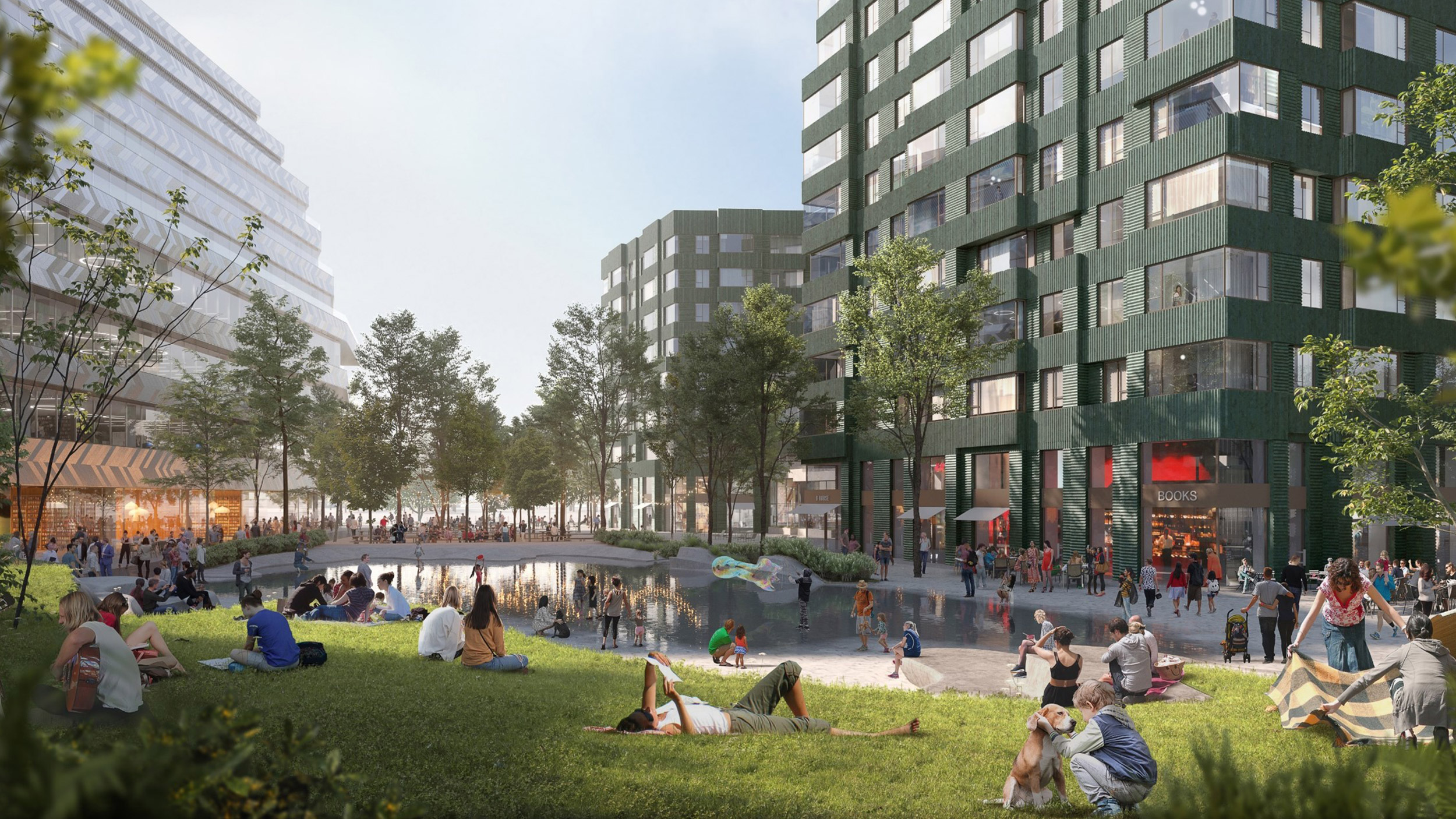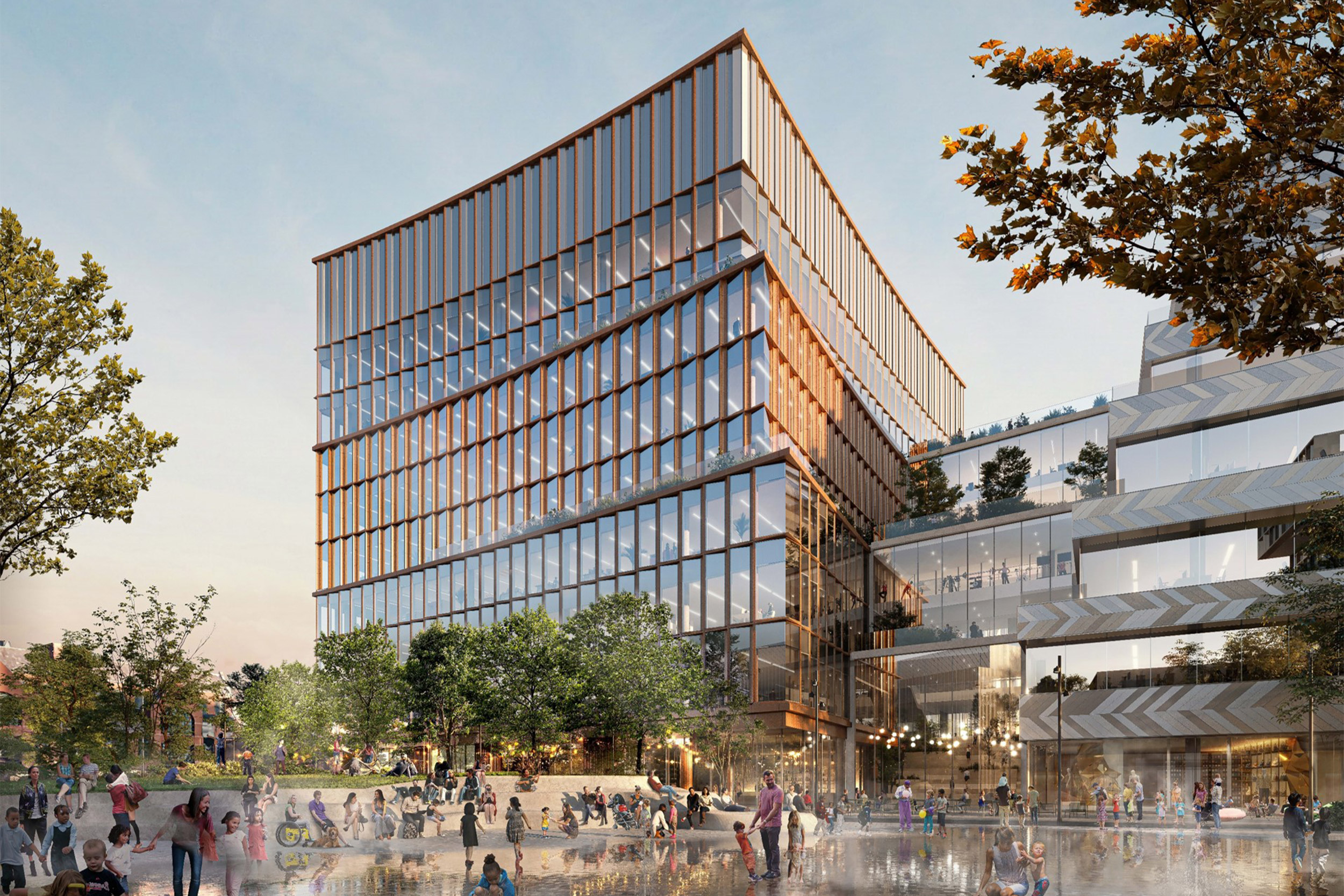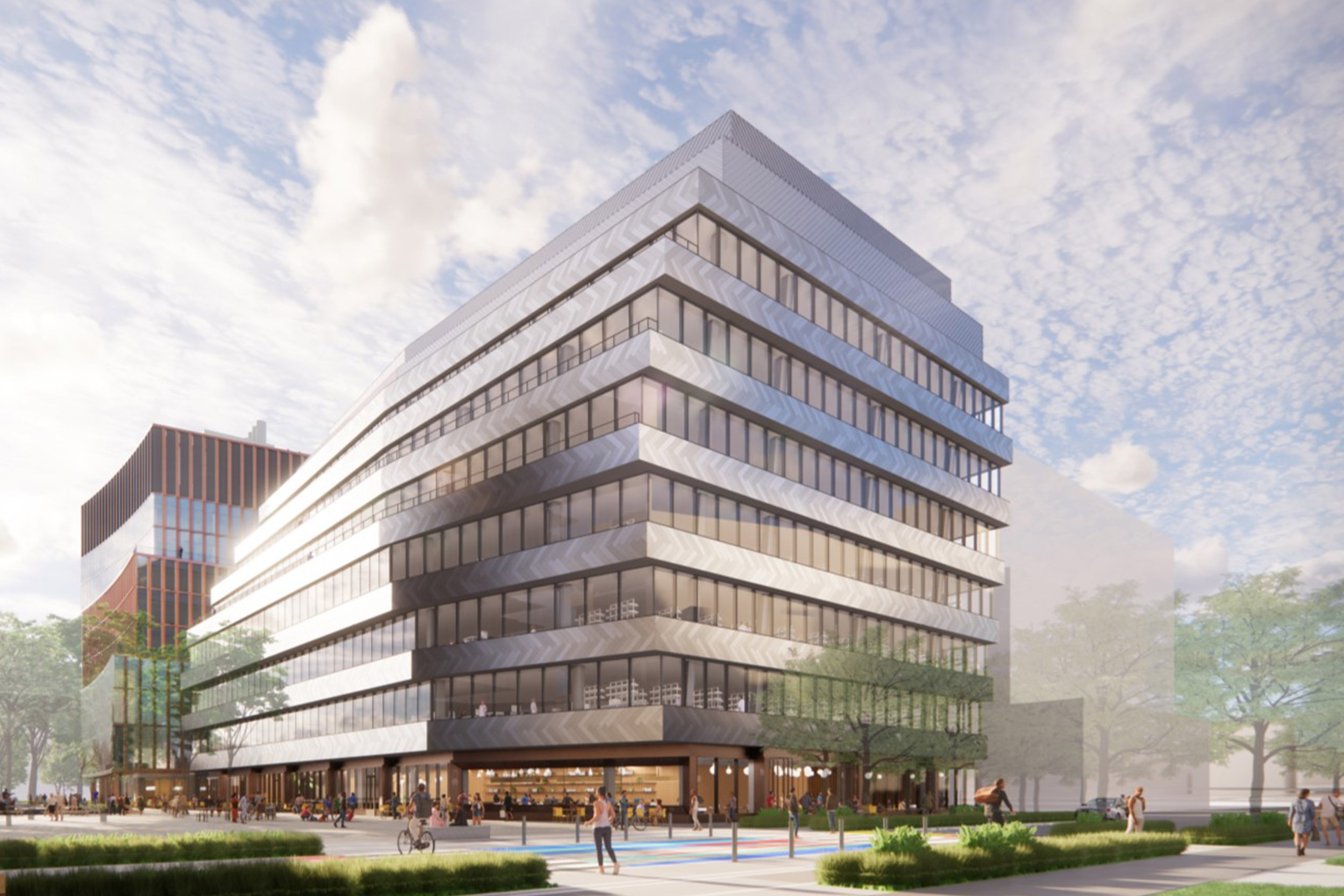
The initial phase of the project includes residential areas, office and lab space, a hotel, a conference center, and more.
Renderings courtesy of Tishman Speyer
Green light for first phase of Harvard’s Enterprise Research Campus
Allston project wins unanimous approval from Boston Planning and Development Agency
The first phase of Harvard University’s Enterprise Research Campus (ERC) in Allston received unanimous approval from the Boston Planning and Development Agency (BPDA) board on Thursday. Phase A consists of 900,000 square feet of mixed-use development that includes residential areas, office and lab space, a hotel, a conference center, restaurant and retail locations, and publicly accessible open and green spaces.
First presented as a concept in 2005, the ERC has been discussed in a series of open community meetings and public filings since 2017. Plans include sites for a range of research-oriented companies, social ventures, businesses, and startups, along with a mix of additional uses such as housing, hotel, and retail space that will contribute to an already active neighborhood.
Harvard has also recognized the role the ERC will play in enhancing and broadening its teaching and research mission, as well as the University’s ability to convene and take part in an innovation ecosystem focused on discovery, disease treatment, and impact. The campus is envisioned as an inclusive center for invention, collaboration, and entrepreneurship, bringing together partners from across Greater Boston and beyond.
“Our vision for an Enterprise Research Campus emerged from deep engagement with the Allston community, the city of Boston, and many more stakeholders over many years, and our work together will be stronger for it,” said Harvard President Larry Bacow. “The ERC will be for everyone. It will expand research and teaching opportunities, and drive innovation focused on areas of inquiry that touch all of our lives — climate, equity, and health chief among them. It will introduce new and expanded kinds of work, including a wide variety of jobs and opportunities. It will also invigorate the area with affordable housing options, green and open space, connectivity and transportation, and places to learn and play. We are thrilled that Phase 1 has been approved.”
Harvard has worked closely with developer Tishman Speyer since 2019, when the firm was chosen as the preferred developer for the first 14 acres of the ERC. Tishman Speyer is known for innovative approaches to architecture, place-making, sustainability, and healthy live-work environments, including Rockefeller Center in New York City.
“We worked in collaboration with the Harvard-Allston Task Force, local residents, the Wu administration, the BPDA, and local elected officials to create a blueprint for a vibrant community powered by innovation, inclusion, and human connection,” said Tishman Speyer CEO Rob Speyer. “The Enterprise Research Campus embraces the Allston and Brighton neighborhoods by delivering quality affordable housing, creating shared outdoor gathering spaces, and including locally owned retail and public art. We are grateful to the BPDA board for their unanimous support. We can’t wait to get started.”
The project in its current form took shape through a public review process that included site walks, surveys, focus groups, more than 12 pop-up events, and more than 10 public meetings. Extensive engagement and feedback from all corners of the community and with the city of Boston created improvements and refinements to the final plan in a range of areas including sustainability, transportation, and housing affordability.
“We are extremely grateful for collaboration with Allston-Brighton community members, the city of Boston, and elected officials around important issues and mutual goals, and are proud of the robust efforts and commitments the University is undertaking to advance this shared vision,” said Katie Lapp, Harvard’s executive vice president. “With our neighbors, we value the importance of fostering collaboration along with diversity, equity, and inclusivity in both the ERC and Greater Boston.”


The ERC project will incorporate development strategies to address the neighborhood’s need for affordable housing. Tishman Speyer has said that 25 percent of all residential housing units (approximately 86 units) in Phase A will be affordable, nearly double the 13 percent of on-site units required under the city of Boston’s 2015 Inclusionary Development Plan. Harvard will also ensure that 20 percent of all units in future ERC development are affordable, ensuring that the neighborhood remains diverse, inclusive, and vibrant.
Harvard will dedicate $25 million over the next 12 years to enable even more affordable housing creation and preservation projects in the Allston-Brighton neighborhood.
Similarly, last summer, as part of ERC planning, Harvard also donated a nearly one-acre parcel at 65-79 Seattle St. in Allston for development of affordable home ownership. Additionally, construction was recently completed on housing at 90 Antwerp St. on University-donated land. The project created 20 mixed-income, deed-restricted homeownership units, 12 of which are affordable, and at no cost to the affordable housing developer.
To further ensure equitable opportunities in the ERC plan, Harvard has indicated that a quarter of the retail areas will be reserved for local, small, and/or minority-/women-owned businesses. The University will also provide $1.05 million over three years toward new and existing workforce education programs, including robust workforce development programs through the Harvard Ed Portal.
To help achieve a collaborative and shared vision for the ways the ERC will take shape within the neighborhood, Harvard will fund and participate in an Allston-Brighton community needs assessment to help inform future community priorities. It will also participate in a city-led planning and rezoning process related to the remaining ERC acreage outside the 14-acre master plan areas already zoned.
Harvard is dedicating 20 percent of the total developable land area in the fully built ERC as publicly accessible open space. Further, it will put in place a 99-year development restriction on the portion of the Allston Greenway that is located within Phase A of the ERC. Beginning at Ray Mellone Park and extending eastward toward the Charles River, the greenway will be built in phases, linking Allston’s residential neighborhoods and public parks to University spaces and commercial development.
The ERC also represents an extension of Harvard’s leadership in sustainability and its commitment to creating healthier spaces. The ERC project will redevelop a long-vacant former industrial site into a vibrant district for residential, commercial, and recreational use. Plans shared for the ERC address sustainability and resiliency on multiple scales, and development in the ERC will be analyzed for opportunities to eliminate or reduce reliance on fossil-fuel energy systems, aligned with Harvard’s long-term goal of being fossil-fuel free by 2050.
The ERC area will also become home to more than 800 newly planted trees, meaning nearly a third of the land will be covered by tree canopy. A robust urban tree canopy is critical for reducing summer peak temperatures, encouraging walkability, and reducing air pollution.
Additionally, the University has offered to fully fund and build the North Allston Storm Drain Extension Project, which would serve more than 1,500 households and property owners across 160 acres of Allston, preventing flooding and potential property damage from stronger and longer storm events caused by climate change. It would also alleviate persistent surface flooding in both the residential and campus acreage it serves and improve the quality and cleanliness of the water deposited into the Charles River.
Harvard’s planning and infrastructure investments to create sustainable ways to access not just the University’s campus in Allston, but also the broader district, have been many years in the making. Upon completion of Phase A, there will be an expanded Harvard shuttle route with free access for Allston Brighton residents and more than 2 miles of new bikes lanes in the community.
The project was supported by all 15 members of the Harvard Allston Task Force.
At Thursday’s public meeting, residents spoke in support of the project. Jaimie McNeil, general agent for hotel and food workers union, Unite Here Local 26, called the project a “a big deal,” and said that it is “evidence of the importance of the community process and shows that the community process really works. … This is a huge, huge, huge victory for the city of Boston.”
“The recent commitments to create deep affordability for 25 percent of housing units in the first phase sets a new standard for sustainable, equitable development in Boston,” said Betty Francisco, who submitted written testimony in support of the project. “The project has also importantly provided community benefits related to job creation, activated green space, and transportation improvements, community funding, and more. These benefits offer significant investments in the future of Allston-Brighton.”
Tishman Speyer expects full-scale construction activities to be underway in 2023.
In the coming years, Harvard and Tishman Speyer will work closely with the Harvard Allston Task Force, the BPDA, elected officials, and members of the community to continue planning conversations related to Phase B of the ERC.
“We’re incredibly pleased to receive this approval from the BPDA, and are excited to move forward,” said Carl Rodrigues, CEO of the Harvard Allston Land Company, which oversees the implementation of the ERC. “We’re very much looking forward to working with the community and taking what we’ve learned from the Phase A process and framework plan into the next stage of the planning process. Together we can ensure that this project simultaneously strengthens and becomes a resource for the local community while transforming the entire region in new and exciting ways.”




